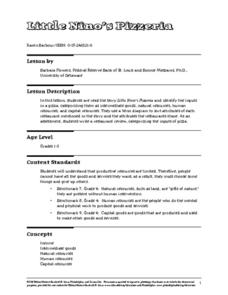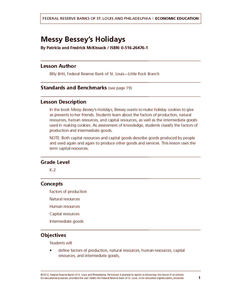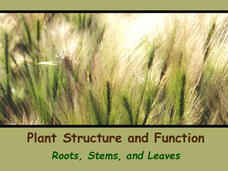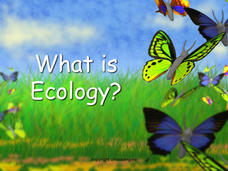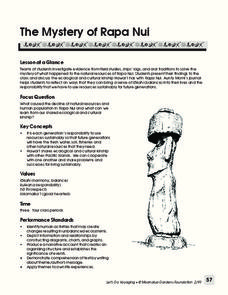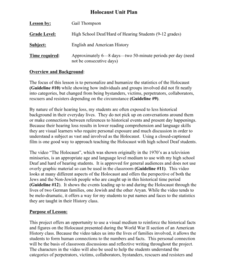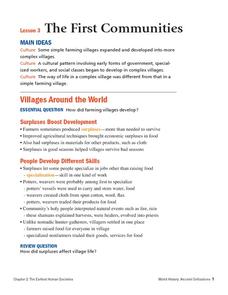K20 LEARN
Lord of the Flies Unit, Lesson 4: Bad to the Bone
Is the nature of humans inherently good or evil? That is the question scholars consider in the fourth lesson of the Lord of the Flies unit. In a Four Corners activity, they examine statements about human nature and stand by the poster...
Federal Reserve Bank
Little Nino's Pizzeria
Engage your youngsters in basic economics by connecting the terms to dessert and pizza! After a discussion about intermediate goods and natural resources, learners read and connect a pizzeria to economic terms.
Federal Reserve Bank
Messy Bessey's Holidays
Teach your class some fairly complex terms—factors of production, human resources, capital resources, natural resources, and intermediate goods—with a storybook (Messy Bessey's Holidays), plenty of visuals and handouts, and related...
Council for Economic Education
Teaching Economics Using Children's Literature
Introduce young learners to the subject of economics using their favorite stories and books. Including 24 separate lessons, this guide covers economic principles such as trade, scarcity, consumer goods and services, renewable and...
Biology Junction
Plant Structure and Function: Roots, Stems, and Leaves
Scientists found fossils of plants more than 420 million years old—but plants existed for up to 100 million years prior to these fossils. Learn about the importance of plants to the entire planet. Viewing a presentation helps scholars...
Wild BC
Is Climate Change Good for Us?
Is it really that big of a deal if the global climate undergoes a little change? Young environmentalists consider this very question as they discuss in small groups the impact of different climate change scenarios on their lives, their...
Chicago Botanic Garden
Introducing Ecosystem Services
Ecosystems provide many things humans not only use but also need in order to survive. The last instructional activity in the series of seven introduces scholars to the idea of ecosystem services, that ecosystems provide humans with many...
Curated OER
Lord of the Flies Anticipation Guide and Activities
“What are we? Humans? Or animals? Or savages?” Ah, the central question of Lord of the Flies. As part of their study of William Golding's riveting novel, readers complete an anticipation guide and respond to a series of survey questions...
Biology Junction
What Is Ecology?
Do you know the name for the biological study of interactions? A short presentation with accompanying worksheet introduces individuals to ecology. The materials offer a broad overview of the subject and the levels of organization to...
Council for Economic Education
The Economics of Income: If You’re So Smart, Why Aren't You Rich?
If basketball players make more than teachers, why shouldn't learners all aspire to play in the NBA? Unraveling the cost and benefits of education and future economic success can be tricky. Economic data, real-life cases, and some...
Tennessee State Museum
An Emancipation Proclamation Map Lesson
Did the Emancipation Proclamation free all slaves during the Civil War? Why was it written, and what were its immediate and long-term effects? After reading primary source materials, constructing political maps representing information...
Moanalua Gardens Foundation
The Mystery of Rapa Nui
What caused the collapse of the environment on Rapa Nui (Easter Island)? Who constructed the Moai? What was their purpose? Class members assume the role of investigators and use evidence drawn from field studies, ships' logs, and...
Agriculture in the Classroom
A Rafter of Turkeys
How did that turkey get from the early Aztec culture to your table? Learn about the history of wild and domesticated turkeys in North America, as well as their inclusion in Thanksgiving traditions, with a two-part agricultural science...
K12 Reader
Irish Proverbs
Add a literary twist to your St. Patrick's day celebration with a worksheet that asks kids to explain what they think the Irish proverbs on this worksheet mean.
American Museum of Natural History
What's This?: Mythic Creatures
Fantastic beasts, and where to find them, are featured in a resource that offers images of real animals that just might have given rise to some of mythic creatures of legend.
Alabama Department of Archives and History
Alabama Tenant Farmers and Sharecroppers, 1865 to Present
The tenant farming and sharecropping systems that developed in the South after the Civil War, the reasons for their development, and the eventual decline of these systems are the focus of this two-day plan.
Global Oneness Project
Highways and Change
What is the cost of change? Roberto Guerra's photo essay "La Carretera: Life and Change Along Peru's Interoceanic Highway" asks viewers to consider the impacts of the 1,600 mile-long highway through Peru and Brazil that connects Pacific...
Western Illinois University
Holocaust Unit Plan
Would it have been you? Scholars investigate the horrors of the Holocaust during World War II. They view, interpret, and analyze the video The Holocaust to gain insight into who exactly was impacted by the events Europe. They then...
Houghton Mifflin Harcourt
The First Communities
These documents list essential questions and foundational concepts associated with early civilizations and farming communities in the agricultural revolution. Use this as a starting point for developing specific lessons and activities...



